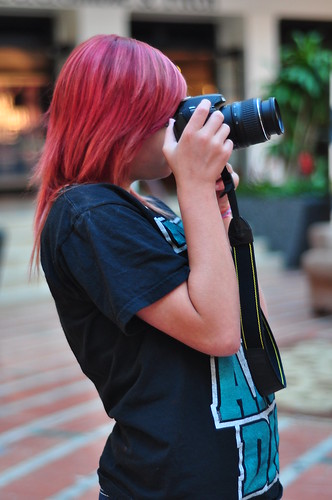There has been much preaching over the past few days about our right to express these less than admirable feelings about our children. How dare we!? How will they feel in five or ten or 30 years should they stumble across a post or a tweet or a status update? Will their worlds come crashing down? The internet is foreeeeever, you know, and hastily written words can’t ever really be removed. Is it worth the instant gratification of expressing these emotions? Aren’t we selfishly putting our needs before theirs?Her basic conclusion is that, no, we're not putting our needs before theirs, we are trying to survive motherhood, and "if publishing a post or tweet or whatever helps me or any other mother get the bad feelings off of our chests and be present for our families, it’s worth it." I generally agree with that reasoning, and I definitely (obviously, since I blog about my family) agree that we it's okay to talk about parenting and tell our stories online. But it got me thinking about something I've wondered before: are things really that different?
Don't get me wrong. I study rhetoric and communication, and I fully believe that the way we are using media is impacting our culture, potentially even changing the way our brains work. I've read Ong and Mcluhan. I am not questioning that the medium has changed or that the medium is important. But I do think that some of the fears about the dangers of new media are misplaced and overblown . . . especially since they're serving the same basic purposes media has always served.
Think about the advancements of writing.
 |
| From b1gw1ght |
Shakespeare's plays were penned using quill and ink; Hemingway used a 1940's Royal typewriter; many modern writers type on their Mac books in wi-fi equipped coffee shops. Undoubtedly, these advances have changed the landscape of writing. More people do it, for one thing. There is more work produced. It's easier to start over. It's easier to reorganize. But none of that changes the reason people write in the first place: to express themselves, to tell a story, to share.
Same with photography. Before there were cameras, people had portraits painted. When cameras were rare and expensive, some people only had pictures of their children taken when they died. As cameras became more common, we developed scrapbooks and covered our walls in family portraits. Now that digital pictures can be taken and shared in a matter of seconds, there are certainly more pictures. We don't have to be as careful about getting the pose right. We can experiment. We can delete that pose that makes our eyes look puffy. But we still take the pictures for the same reason: to capture a moment, to share experiences with people who weren't there, to remember.
 |
| From Courtney Carmody |
That's what we need to talk about when we consider the dangers of new media: why are we doing what we do?
Is posting pictures to our Facebook wall of our kids doing something cute really that different than local papers? I grew up in a small town, and there was a column in the weekly county-wide newspaper that ran people's photos. One week my mom got one published of me jumping on our little trampoline in the house. The caption said "She jumped so high she touched the sky." It served the same purpose as a Facebook photo with a silly caption: she wanted to show it to her friends and acquaintances. Could someone perverted looked at that picture? Of course. That's always been a risk. And is it (as articles like this one warn us) an increased risk on the internet? Well, just as with the writing and photography, technological advances often mean easier sharing, more widespread access, and more material. We create new guidelines to navigate what that growth means. We shouldn't try to shut it down.
And what of the concern people shared with Scary Mommy? What if our kids find these things we've said about them in five or ten years? Well, we're judging their reactions against outdated norms. Their reactions will be situated in a completely different context. They and all of their friends will have had their pictures posted on Facebook, their first tooth tweeted, their lives documented. Trying to fight that seems to me as pointless as trying to get people to start getting their Christmas card pictures created as individually painted portraits. This is the digital landscape we live within, and we will adapt. We've had a lot of practice.
Is posting pictures to our Facebook wall of our kids doing something cute really that different than local papers? I grew up in a small town, and there was a column in the weekly county-wide newspaper that ran people's photos. One week my mom got one published of me jumping on our little trampoline in the house. The caption said "She jumped so high she touched the sky." It served the same purpose as a Facebook photo with a silly caption: she wanted to show it to her friends and acquaintances. Could someone perverted looked at that picture? Of course. That's always been a risk. And is it (as articles like this one warn us) an increased risk on the internet? Well, just as with the writing and photography, technological advances often mean easier sharing, more widespread access, and more material. We create new guidelines to navigate what that growth means. We shouldn't try to shut it down.
And what of the concern people shared with Scary Mommy? What if our kids find these things we've said about them in five or ten years? Well, we're judging their reactions against outdated norms. Their reactions will be situated in a completely different context. They and all of their friends will have had their pictures posted on Facebook, their first tooth tweeted, their lives documented. Trying to fight that seems to me as pointless as trying to get people to start getting their Christmas card pictures created as individually painted portraits. This is the digital landscape we live within, and we will adapt. We've had a lot of practice.

This is a great post! I hadn't really considered it but yes, we now have the ability to easily document the seeming minutia of our lives. Today's children won't know any other way. They are learning to document their own lives as they also learn to read and tie their shoes. I would have loved to know what my mom would have written about her children back in the day. Things she can't remember now. Things that might help me lay some of my own memories to rest.
ReplyDeleteI think what happens is with more information out there, people are getting buried in information. We talk about what people will think when they read what we wrote, but honestly who has time to read it all and will they even find it? And if they do, do they care enough to actually read it, how much time do they have, can they read it all even if they wanted to? I think the answer is no.
ReplyDeleteI blog (next month marks 7 years) and my own friends and family don't want to know what I say enough to read it. They don't care to know all that stuff, yet strangers want to read it. Fine by me. Even my husband says, "Who cares about some of what you blog?" I say "I don't know but I blog and people read so I'm going to keep it up". With that said 3 family recipes I use and blogged about are top hits on google and I'm glad that other people are enjoying eating that food if they actually make the recipes!
I recently shared an important piece of news about our son on Facebook to my personal friends. It was definately worthy of sharing on FB. Especially with the new FB wall post notification system I find it hard to see what my friends share. (When I have time and am thinking of a friend I choose to click on their wall and scan it for new stuff or click on their photo album to see if anything is new.)
I was speaking to a friend on the phone who lives far away now that I've moved. I asked if she saw what I posted, if not I'd tell here. She said she must have missed it and she feels she misses a lot of updates from everyone, so I told her the news. Well if she's so curious and has 2 minutes why not click my FB wall and skim it for anything that may be worthy to know?
People have limited time. And some don't care what we say.
With that said I am being careful about what I say about my 14 and 11 year old. I imagine what would happen if one of their friends read the blog. Would there be fallout or embarrassment? If so I don't say it.
Yet the fact that we homeschool and that my blog is about parenting means sometimes I do share painful moments or emotional hand wringing in order to "keep it real" and not portray some fake Pollyanna perfect homeschool. A risk with having a very perfect sounding homeschool blog is that it turns some people away from homeschooling thinking they could never be so perfect. So I keep it real.
From someone that can definitely lean towards misplaced and overblown reactions, thank you so much for this post! To quiet our stories would be a shame, which is why I blog. I especially appreciate your observation that we're judging their reactions out of context. The raise these kids are being raised (in terms of social media and over sharing) is so completely different.
ReplyDelete